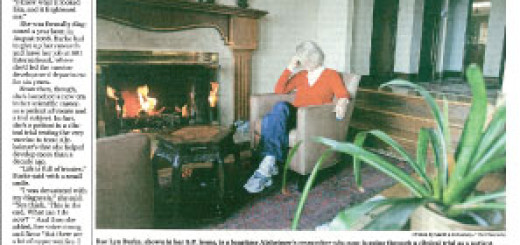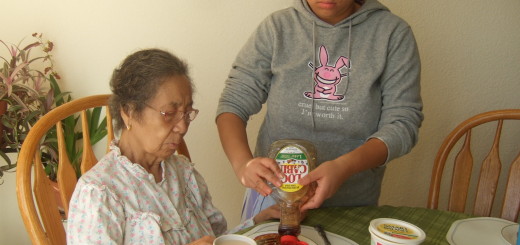North Bay caregiver finds connection in support groups
For Caregiver month we’re highlighting Elenita, a caregiver in the North Bay. This is the first part of a two-part series. The second part, about home safety, can be found here
Elenita is the primary caregiver for her husband Dennis, who has been living with Alzheimer’s for the last four years. Through their support group, Elenita and Dennis made new friends that they keep in touch with to this day. Elenita encourages other caregivers to reach out to the Alzheimer’s Association® for support.
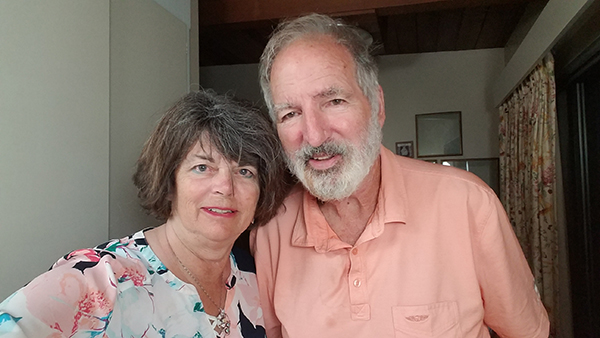
Withdrawing from others
Prior to his diagnosis, Dennis was a financial planner in the North Bay. “Dennis was always active, playing tennis and socializing with friends and family” shared Elenita. “He enjoyed entertaining, planning trips, driving cars, managing our finances, and taking in theater and concerts. He was engaged and engaging, with humor and intelligence.”
At first Elenita noticed that Dennis was doing things that didn’t make sense, but she didn’t think anything of it. “We were at Friday Night Lights in Cloverdale,” said Elenita. “He went to the bathroom and asked me to meet him some place that wasn’t logical. Since he was from the area, I assumed he had some reason for it.”
Eventually, Elenita noticed that Dennis had become reluctant to call his clients back, which was out of character for him. Elenita said, “He loved educating clients. He’s a storyteller and loves getting to know more about people.”
One day, a client came in angry and demanded to know where her money was. Dennis, who had previously explained the positions of her portfolio, but now he was unable to convey that information to the client. When Elenita saw this interaction between her husband and the client, she knew something was wrong.
In 2015, Dennis had bladder cancer and retired from his career. Elenita and Dennis consulted a doctor about his memory loss and confusion. After two assessments, Dennis was diagnosed with Alzheimer’s disease in 2016.
Clinical trials
Clinical trials are used to accelerate progress and provide valuable insight into potential treatments and methods of prevention. Without them, there can be no better treatments, no prevention and no cure for Alzheimer’s disease.
Alzheimer’s Association TrialMatch® is a free, easy-to-use clinical studies matching service that generates customized lists of studies based on user-provided information. TrialMatch is for individuals living with Alzheimer’s, caregivers and healthy volunteers without dementia.
Elenita and Dennis wanted to use Dennis’ diagnosis to help the greater good and participate in a clinical study. While they did not use TrialMatch, they were connected with a clinical research neurologist in San Francisco and Sebastopol. Unfortunately, Dennis did not qualify to participate in their studies. However, through this process, they found the Alzheimer’s Association.
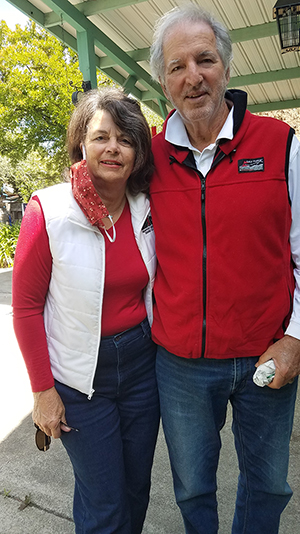
Early-stage support groups
Elenita and Dennis were originally connected with an Alzheimer’s Association Early-Stage Support Group in San Francisco. “The woman from the San Francisco group referred us to the Early-Stage Support Group in Santa Rosa,” said Elenita. “We were interviewed, accepted into the group and started in the spring of 2018.”
The Alzheimer’s Association Early-Stage Support Groups are designed for the person with a physician’s diagnosis of Alzheimer’s disease or a related disorder. The person living with the disease must be aware of their diagnosis and have mild symptoms. Most groups have a concurrent meeting for care partners. The groups provide information, emotional and practical support and a way to connect with people going through similar situations. A phone interview is required prior to joining.
Making new friends
Prior to the pandemic, Elenita and Dennis would get together with the friends they made from their Early-Stage Support Group. They would go on trips, take sunset cruises, ride the SMART train to meet for lunch, and take walks together.
Since the pandemic, these get togethers have been much less frequent. However, following CDC guidelines, they have recently been able to spend time together and celebrate birthdays. “We were told we were unique about how much we care about each other,” shared Elenita. “There were six couples who matriculated out. We decided we needed a new support group for the next phase.”
Working with the Alzheimer’s Association, they were able to form a Caregivers Support Group, which Elenita loving refers to as the “OMG” or “The Original Monday Group.” While they no longer meet on Mondays, their new support group meets with a trained facilitator every other Friday on a virtual platform.
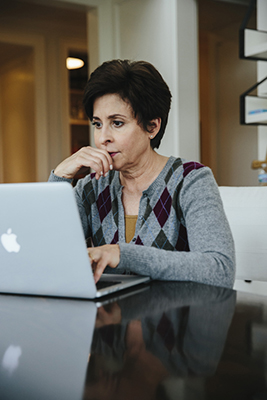
Join a Caregiver Support Group
Currently, the Alzheimer’s Association Northern California and Northern Nevada Chapter has over 100 Caregiver Support Groups. These groups are offered Monday through Saturday and start as early as 8 a.m. and as late as 7:30 p.m. Groups are offered in different languages and for specific types of dementia. Because of the pandemic, all of our Caregiver Support Groups are being offered virtually.
“People should not be shy or afraid to join a support group,” said Elenita. “They should embrace the opportunity because the people you meet are not only going on the same journey of ambiguous loss, but also might become friends, sharing common or unique insights, relevant perspectives, and selfless information.”
Connecting with others
Elenita suggests caregivers find people who have experience caring for someone with dementia. “I played tennis with someone who took care of her mom for several years,” said Elenita. “She’s my resource. Once you find a resource that’s willing to share with you then stay close to that person. Find out as much as you can about the disease in advance.” Another way to get information is to attend one of the many virtual education classes offered by the Alzheimer’s Association.
She also suggests that you find a support system. As a caregiver, you may find yourself with so many responsibilities that you neglect taking good care of yourself. But the best thing you can do for the person you are caring for is to stay physically and emotionally strong.
Elenita first suggests you contact the Alzheimer’s Association to find a support group, but if that isn’t something you’re interested in, she also recommends finding respite care. “Find a support group or a therapy session. Therapy can help you. Do whatever you need to stay healthy.”
For more information on support groups, education classes, or respite services, visit our website or call the Alzheimer’s Association 24/7 Helpline at 800.272.3900.
Learn more:






